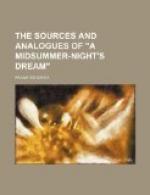The maid, seeing him bare in clothes, pitied him, and against the next night provided him a waistcoat. Robin, coming the next night to work, as he did before, espied the waistcoat, whereat he started and said—
Because thou lay’st me, himpen, hampen,[6]
I will neither bolt nor stampen;
’Tis not your garments new or old
That Robin loves: I feel no cold.
Had you left me milk or cream,
You should have had a pleasing dream:
Because you left no drop or crumb,
Robin never more will come.
So went he away laughing, ho, ho, hoh! The maid was much grieved and discontented at his anger: for ever after she was fain to do her work herself without the help of Robin Good-fellow.
HOW ROBIN GOOD-FELLOW LED A COMPANY OF FELLOWS OUT OF THEIR WAY
A company of young men having been making merry with their sweethearts, were at their coming home to come over a heath. Robin Good-fellow, knowing of it, met them, and to make some pastime, he led them up and down the heath a whole night, so that they could not get out of it; for he went before them in the shape of a walking fire, which they all saw and followed till the day did appear: then Robin left them, and at his departure spake these words—
Get you home, you merry lads!
Tell your mammies and your dads,
And all those that news desire,
How you saw a walking fire.
Wenches, that do smile and lisp
Use to call me Willy Wisp.
If that you but weary he,
It is sport alone for me.
Away: unto your houses go
And I’ll go laughing ho, ho,
hoh!
The fellows were glad that he was gone, for they were all in a great fear that he would have done them some mischief.
HOW ROBIN GOOD-FELLOW SERVED A LECHEROUS GALLANT
Robin always did help those that suffered wrong, and never would hurt any but those that did wrong to others. It was his chance one day to go through a field where he heard one call for help: he, going near where he heard the cry, saw a lusty gallant that would have forced a young maiden to his lust; but the maiden in no wise would yield, which made her cry for help. Robin Good-fellow, seeing of this, turned himself into the shape of a hare, and so ran between the lustful gallant’s legs. This gallant, thinking to have taken him, he presently turned himself into a horse, and so perforce carried away this gallant on his back. The gentleman cried out for help, for he thought that the devil had been come to fetch him for his wickedness; but his crying was in vain, for Robin did carry him into a thick hedge, and there left him so pricked and scratched, that he more desired a plaister for his pain than a wench for his pleasure. Thus the poor maid was freed from this ruffian, and Robin Good-fellow, to see this gallant so tame, went away laughing, ho, ho, hoh!




